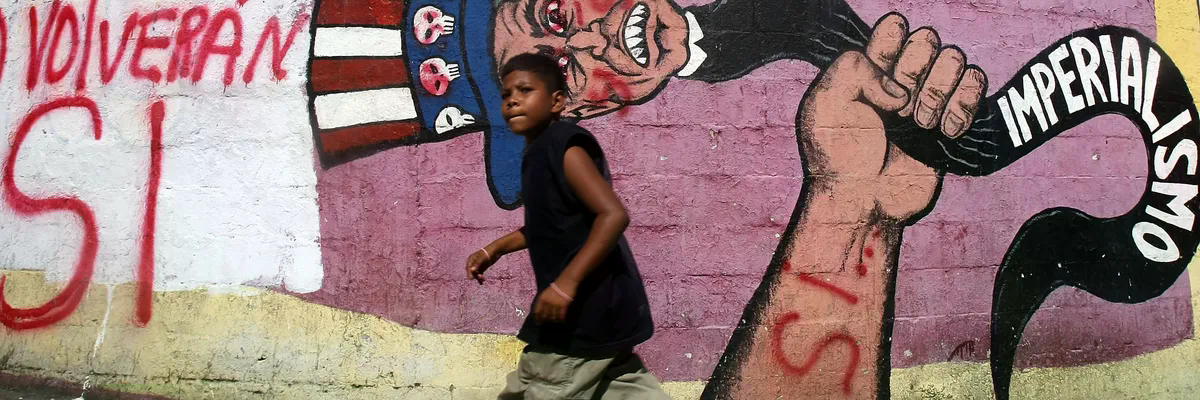
President Donald Trump’s authorization of Central Intelligence Agency (CIA) operations aimed at toppling Venezuelan President Nicolás Maduro has drawn concern from foreign policy experts, who warn of another U.S. “war of choice.” This development has also prompted the introduction of a bipartisan Senate resolution seeking to block unauthorized military action against Venezuela.
Matt Duss, executive vice president of the Center for International Policy, a Washington-based think tank, expressed deep concern over reports that the Trump administration has authorized covert efforts to foment regime change in Venezuela. He emphasized that these actions follow previous instances of the administration using military force without proper authorization, including incidents involving vessels and crews in the Caribbean that have been described as extrajudicial killings.
Trump claimed on Wednesday that he had authorized the CIA to conduct covert operations inside Venezuela for two reasons: the alleged release of prisoners into the United States and the flow of drugs through the country. However, experts and U.S. officials have consistently refuted the claim about prisoners being sent to the U.S., calling it baseless. Regarding drug trafficking, while Venezuela serves as a transit point for cocaine, the majority of narcotics entering the United States come through routes in Mexico, Central America, and the Pacific coast. Venezuela is not a significant source of fentanyl, which is primarily trafficked through Mexico.
Duss warned that using covert or military measures to destabilize or overthrow regimes echoes troubling episodes in American foreign policy that have undermined human rights and sovereignty in Latin America and the Caribbean. John Coatsworth, a historian specializing in Latin America, noted that the U.S. has launched at least 41 interventions that successfully overthrew governments in the region since 1898, with many more military interventions occurring over time.
U.S. involvement in Venezuelan affairs dates back to the 19th century, including an 1895 boundary dispute with Britain. Since then, Washington has supported authoritarian leaders and assisted in subverting democratic movements, including training Venezuelan forces in torture and repression at the U.S. Army School of the Americas. In recent decades, successive administrations have worked to counter the Bolivarian Revolution initiated by former President Hugo Chávez and continued under Maduro. Under Trump, the U.S. has deployed warships and troops near Venezuela, a move reminiscent of past U.S. imperialist strategies in the region.
Research from the Center for Economic and Policy Research suggests that U.S. economic sanctions on Venezuela have contributed to the deaths of tens of thousands of Venezuelans. Venezuelan President Maduro accused the U.S. of sending the CIA to carry out regime change, stating that no U.S. government has ever openly ordered the agency to kill, overthrow, or destroy other countries. He also suggested that the U.S. interest in Venezuela stems from its natural resources.
Duss highlighted that the U.S. continues to face the consequences of past interventions, particularly in relation to migration and drug trade challenges. He stressed that such interventions rarely lead to democratic or peaceful outcomes, instead exacerbating internal divisions and reinforcing authoritarianism.
Tim Weiner, a Pulitzer Prize-winning author of CIA histories, noted that even successful covert operations have created long-term problems. He referenced the 1954 CIA coup in Guatemala, which led to decades of repression and violence against Indigenous Mayan peoples. Joseph Addington, associate editor at The American Conservative, argued that any U.S. invasion of Venezuela would involve significant costs and risks that policymakers must carefully consider.
Duss pointed out that Trump, who ran as an anti-war candidate, does not have broad public support for military involvement in Venezuela. He urged lawmakers to make it clear that the administration lacks both public and congressional authorization for military action in the region.
On Friday, a bipartisan group of U.S. senators—Tim Kaine (D-Va.), Rand Paul (R-Ky.), and Adam Schiff (D-Calif.)—introduced a war powers resolution to prevent U.S. military action within or against Venezuela. Kaine expressed concern over the administration’s potential for illegal military strikes, emphasizing that Americans do not want further wars that could destabilize the region and increase migration flows.
This marks the second attempt by Kaine and Schiff to introduce such a measure. Earlier this month, a similar resolution was defeated, with Democratic Senator John Fetterman voting against it alongside Republican colleagues. Meanwhile, Senator Rand Paul supported the legislation, along with independent Senators Bernie Sanders and Angus King.


